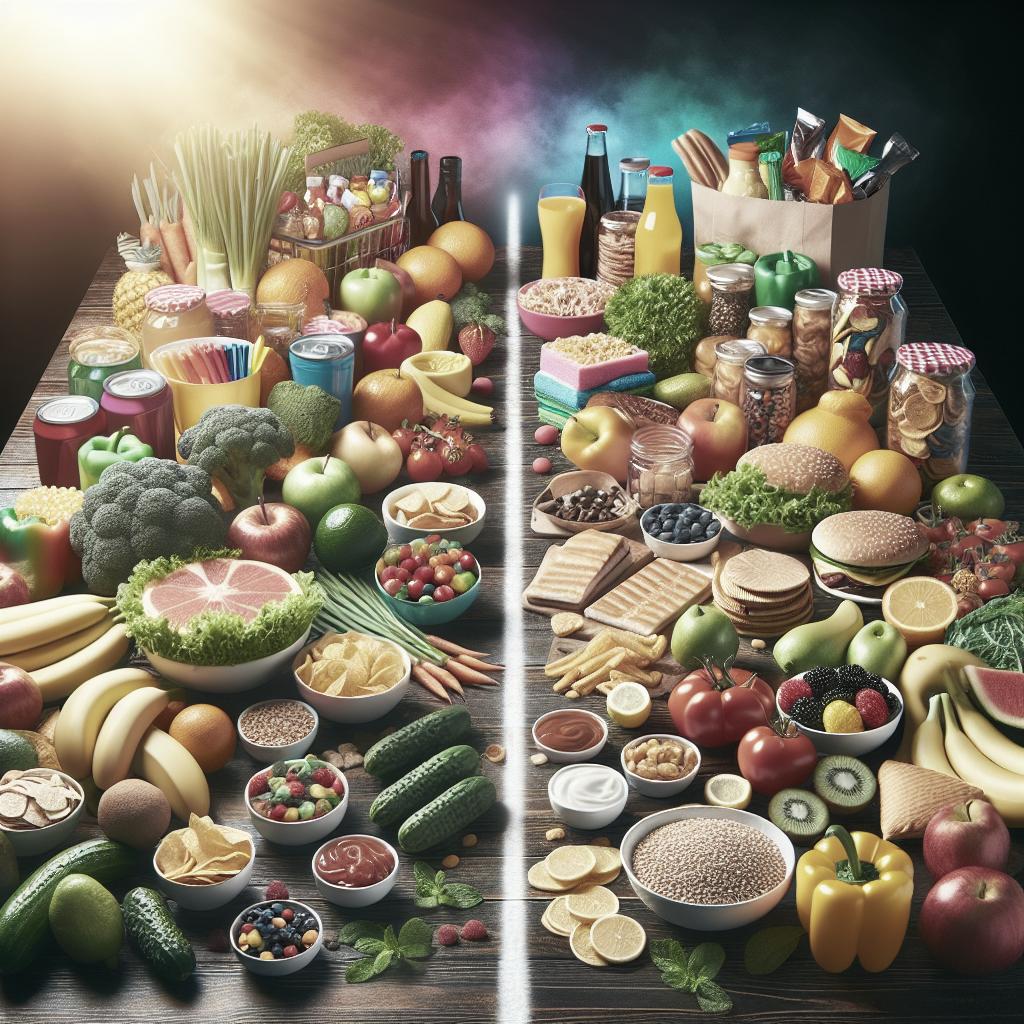<>
In our fast-paced world, optimizing family health can be a daunting task. Despite the vast availability of convenience foods that claim to be healthy, many actually contain hidden ingredients that are harmful over time. This blog aims to shed light on commonly perceived “healthy” foods that families should approach with caution. From granola bars to diet sodas, we’ll break down why these items might not be as nutritious as they seem and suggest alternatives. Our goal is to help you make informed choices to enhance your family’s well-being.
How we vet brands and products
When evaluating brands and products, we delve deeper than just the marketing claims. We examine ingredient lists, nutritional content, and overall health impacts. We consider expert opinions, reliable studies, and real-world testimonies to provide well-rounded suggestions for families. This vetting process ensures that our recommendations are reliably based on evidence, not just trends.
1. Granola and granola bars
Granola and granola bars are often marketed as nutritious, appealing to fitness enthusiasts and busy families alike. However, many brands are laden with sugar, unhealthy fats, and preservatives. A single serving of certain granolas can contain up to 12 grams of added sugar, pushing families towards unhealthy blood sugar levels and causing energy crashes later in the day. Additionally, they might incorporate hydrogenated oils to enhance texture, which can contribute to harmful cholesterol levels. For a healthier alternative, consider homemade granola with oats, nuts, and a drizzle of raw honey or pure maple syrup. This way, you control the ingredients and avoid excess sugars and unhealthy fats. Opting for fresh fruit or yogurt as toppings can also be beneficial.
2. Flavored yogurts
Flavored yogurts seem like a perfect snack or breakfast option, especially for children. However, these often contain high levels of added sugars and artificial flavors. Some flavored yogurts can include up to 19 grams of sugar per serving, which is comparable to eating candy bars. These sugars contribute to weight gain, increased risk of diabetes, and dental issues. Swapping flavored yogurts with plain Greek yogurt and adding natural sweeteners like honey or fresh fruit can significantly improve nutritional intake. Greek yogurt is high in protein and low in sugars, offering a balanced choice for family diets.
3. Protein drinks and bars
Protein drinks and bars are appealing due to their convenience and their marketing as muscle-building and energy-boosting supplements. However, many of these products are packed with sugars, artificial ingredients, and low-quality protein sources. Some protein bars contain up to 30 grams of sugar and numerous unpronounceable additives, leading to poor nutritional value and potential digestive issues. Opt for whole food sources of protein such as nuts, seeds, lean meats, or legumes. If you need a convenient snack, choose bars with minimal ingredients, focusing on natural components like dates, nuts, and seeds.
4. Sports drinks and energy beverages
Designed to rehydrate and replenish electrolytes, sports drinks are often consumed even when not necessary. They usually contain high levels of sugars and artificial colors. One bottle can include up to 34 grams of sugar, which is unnecessary for most people outside of intense athletic training. Energy beverages add to this with caffeine and questionable stimulants, posing risks such as heart palpitations and increased blood pressure. For hydration, water remains the best choice. For electrolyte replenishment after intense activities, coconut water or homemade electrolyte drinks with a pinch of salt and a bit of fruit juice can serve as healthier alternatives.
5. Gluten-free snack foods
The gluten-free trend has surged, but not all gluten-free products are healthy. Many gluten-free snacks compensate for lack of texture and flavor with added sugars, fats, and preservatives. These additives can negate perceived health benefits, and often gluten-free snacks are low in fiber and protein, vital nutrients for a balanced diet. To ensure nutritious gluten-free eating, focus on whole, naturally gluten-free foods like fruits, vegetables, lean proteins, and whole grains like quinoa or brown rice. Homemade snacks like roasted chickpeas or fresh fruit can also satisfy cravings while maintaining family health.
6. Some low-fat and fat-free products
Low-fat and fat-free products often sound appealing for weight management, but these versions can be misleading. Removing fat commonly involves adding sugars and starches to preserve flavor and texture. These added ingredients can contribute to insulin resistance and weight gain, countering the intent of choosing such products. Embrace full-fat versions of foods like cheese and yogurt in moderation, as fats are essential for nutrient absorption and overall health. The focus should be on the type of fat consumed, prioritizing healthy fats from sources such as avocados, nuts, and seeds.
7. Breakfast cereal
Breakfast cereal is a staple in many households, particularly appealing due to its convenience. However, the majority of these cereals are high in sugars and low in essential nutrients. Some cereals contain more sugar than a dessert, contributing to spikes in blood sugar and a lack of sustained energy. Opt for whole-grain cereals with minimal added sugars, or better yet, consider oatmeal or homemade muesli as healthier choices. These options provide fiber and essential nutrients, helping to start the day on a balanced note.
8. Some vegetable oils
While vegetable oils like canola and soybean oil are ubiquitous, they are not always the healthiest option. These oils often contain high amounts of omega-6 fatty acids, which can contribute to inflammation when consumed in excess. Additionally, many vegetable oils are highly processed, stripping them of beneficial nutrients and introducing harmful trans fats. Consider using healthier oil alternatives, such as extra virgin olive oil or avocado oil. These oils offer beneficial omega-3 fatty acids and antioxidants, promoting better heart health and reduced inflammation.
9. Premade smoothies
Premade smoothies are marketed as a quick and easy way to get your daily dose of fruits and vegetables. However, many of these smoothies are loaded with added sugars and fruit concentrates, lacking the fiber found in whole fruits. This results in quick sugar absorption and subsequent crashes in energy. Homemade smoothies with fresh ingredients allow for control over sugar intake and ensure the inclusion of fiber. Incorporating vegetables like spinach or kale, along with a protein source such as Greek yogurt or almond butter, can create a balanced and nutritious drink.
10. Diet soda
Diet sodas are popular for those looking to reduce calorie intake while still enjoying a sweet beverage. Despite being calorie-free, these drinks often contain artificial sweeteners, which can have adverse health effects. Studies suggest that artificial sweeteners can disrupt gut bacteria and may be linked to metabolic issues such as weight gain and insulin resistance. Replacing diet soda with sparkling water flavored with fresh fruit or herbal teas can be a healthier alternative. These options provide flavor without the risks associated with artificial sweeteners.
11. Some plant-based meat products
Plant-based meat products are on the rise, praised for their lower environmental impact and ethical benefits. However, many of these products are highly processed and contain numerous additives to mimic the taste and texture of real meat. High in sodium and other preservatives, they might not be as healthy as whole-food plant options. Focusing on whole plant foods such as beans, lentils, and tofu can offer the nutritional benefits of a plant-based diet without the downsides of processed alternatives. These options provide fiber, protein, and essential nutrients needed for a balanced diet.
12. Frozen yogurt
Frozen yogurt is often viewed as a healthier alternative to ice cream, but it can still be high in sugars. Many commercial frozen yogurts contain just as much, if not more, sugar than traditional ice cream, negating potential health benefits. For a better option, consider making homemade frozen yogurt using plain Greek yogurt and a small amount of natural sweeteners or fresh fruit. This ensures more control over sugar content and provides the added benefits of probiotics found in yogurt.
13. Yogurt-covered pretzels and raisins
Yogurt-covered snacks might seem nutritious, but the yogurt coating is commonly filled with sugar and hydrogenated oils. This transforms what could be a healthy snack into one that’s high in empty calories and unhealthy fats. Choosing plain pretzels or raisins without the sugary coating can help reduce unnecessary sugar and fat intake. Pairing these with a handful of nuts or a piece of fruit can turn them into a balanced, wholesome snack.
14. Some plant-based milks
Plant-based milks are often perceived as healthier alternatives to dairy. However, many varieties contain added sugars and thickeners like carrageenan, which have been associated with digestive issues and inflammation. Furthermore, some plant-based milks lack the protein and other nutrients found in cow’s milk. To choose the healthiest plant-based milk, look for unsweetened versions with minimal ingredients. Fortified options that include added calcium and vitamins can help bridge any nutritional gaps.
The bottom line
Making informed choices about the foods your family consumes is critical for maintaining good health. Though many marketed products appear healthy at first glance, a closer look often reveals hidden sugars, unhealthy fats, and artificial additives. By focusing on whole foods and homemade alternatives, families can better support their long-term well-being and minimize potential health risks.
Just one thing
Always read labels carefully. Understanding the ingredients and nutritional information of the products you buy can help you make smarter choices. A little effort in scrutinizing what you eat can lead to significant health benefits for your entire family.
| Food/Product | Reason to Avoid | Healthier Alternative |
|---|---|---|
| Granola and granola bars | High in sugars, unhealthy fats | Homemade granola |
| Flavored yogurts | High sugar content | Plain Greek yogurt with fresh fruit |
| Protein drinks and bars | Added sugars, low-quality protein | Whole food protein sources |
| Sports drinks and energy beverages | High sugars, artificial colors | Water, coconut water |
| Gluten-free snack foods | Added sugars, low fiber | Whole, naturally gluten-free foods |
| Low-fat and fat-free products | Added sugars, starches | Full-fat products in moderation |
| Breakfast cereal | High sugars, low nutrients | Whole-grain cereals, oatmeal |
| Some vegetable oils | High omega-6, processed | Olive oil, avocado oil |
| Premade smoothies | Added sugars, lack of fiber | Homemade smoothies |
| Diet soda | Artificial sweeteners | Sparkling water with fruit |
| Plant-based meat products | Highly processed, additives | Whole plant foods |
| Frozen yogurt | High sugar content | Homemade frozen yogurt |
| Yogurt-covered pretzels and raisins | Sugar, hydrogenated oils | Plain pretzels, raisins |
| Plant-based milks | Added sugars, thickeners | Unsweetened, fortified plant-based milks |


